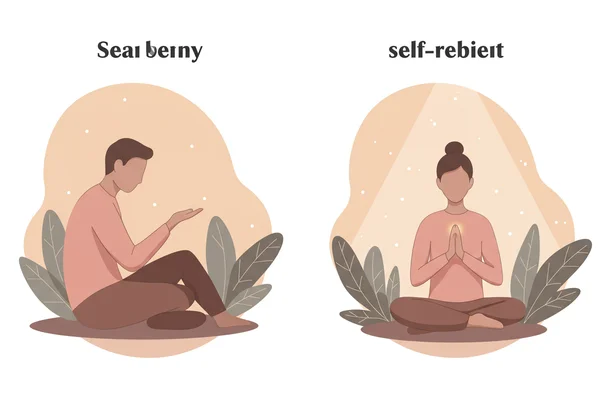나르시시스트 대처법: 전략 및 NPD 진단 여정
August 10, 2025 | By Clara Jennings
관계 속에서 감정적으로 소진되고, 혼란스러우며, 존재를 무시당하는 느낌이 드시나요? 당신은 혼자가 아닙니다. 배우자, 부모, 형제자매 등 나르시시스트에게 대처하는 것 은 어둠 속에서 길을 잃은 듯한 미로를 헤쳐나가는 것과 같을 수 있습니다. 그들의 세상은 종종 자신의 필요 중심으로 돌아가며, 당신은 자신의 현실을 의심하게 됩니다. 이런 상황에 처한 많은 사람들이 조용히 궁금해합니다. "내 파트너가 NPD인지 어떻게 알 수 있을까?" 이 가이드는 당신의 정신 건강을 보호하고 더 건강한 상호작용을 촉진하는 데 도움이 되는 공감적이고 실행 가능한 전략을 제공합니다.
상황의 역학 관계를 이해하는 것이 첫 번째 중요 단계입니다. 이 글은 대처 메커니즘을 제공하지만, 관찰하고 있는 특성에 대한 초기 명확성을 얻는 것이 가장 중요합니다. 기밀이 유지되는 과학 기반의 시작점을 위해, 자기중심적 특성을 식별하도록 설계된 무료 온라인 NPD 테스트로 기밀 NPD 스크리닝을 시작할 수 있습니다.

자기중심적 특성 이해 및 그 영향
자기중심적 경향을 보이는 사람과의 관계를 효과적으로 관리하려면 먼저 무엇에 대처하고 있는지 이해해야 합니다. 자기중심적 성격 장애(NPD)는 복잡한 정신 건강 상태이며, 사랑하는 사람들에게 미치는 영향은 지대할 수 있습니다. 이는 단순한 이기심을 넘어, 과대성, 끊임없는 칭찬 추구, 놀라운 공감 능력 부족의 만연한 패턴입니다.
자기중심적 행동의 원인과 그것이 상처를 주는 이유
핵심적으로 자기중심적 행동은 종종 깊이 뿌리내린, 그러나 잘 숨겨진 불안감과 깨지기 쉬운 자아에 의해 주도됩니다. 결코 채워지지 않는 빈 통을 상상해 보세요. 이는 나르시시스트의 검증에 대한 필요성, 즉 "자기중심적 공급"과 유사합니다. 그들은 자신이 가치 있고 강력하다고 느끼기 위해 외부의 칭찬과 관심에 의존합니다.
이것이 그들의 행동이 그렇게 큰 상처를 주는 이유입니다. 당신의 필요, 감정, 성공은 종종 그들 자신의 것에 대한 위협이나 방해물로 인식됩니다. 그들은 자신을 높이기 위해 당신의 성과를 깎아내리거나, 진정으로 공감할 능력이 부족하기 때문에 당신의 감정을 무시할 수 있습니다. 이러한 끊임없는 무효화는 당신을 지치고, 하찮게 느끼며, 고립되게 만듭니다.

자기중심적 학대 및 조작의 순환 인식
자기중심적 특성이 강한 사람과의 관계는 종종 학대 순환으로 알려진 예측 가능하고 해로운 패턴을 따릅니다. 이 순환에는 이상화(그들이 당신에게 애정을 쏟는 단계), 평가 절하(그들이 당신을 비판하고 폄하하기 시작하는 단계), 그리고 폐기(당신이 더 이상 그들의 필요를 충족시키지 못할 때 관계를 갑자기 끝내는 단계)가 포함됩니다.
자신의 인식과 정신 건강을 의심하게 만드는 가스라이팅과 같은 조작 전술은 통제를 유지하기 위해 흔히 사용되는 도구입니다. 이러한 패턴을 인식하는 것은 자기 보존을 위한 중요한 행위입니다. 당신이 목격하고 있는 특성을 이해하는 데 도움이 되도록, 객관적인 NPD 테스트의 관점은 필요한 많은 검증을 제공할 수 있습니다.
자기중심적 성향의 사람과의 경계 설정에 대한 필수 전략
당신이 가진 가장 강력한 도구 중 하나는 경계를 설정하고 시행하는 능력입니다. 이것은 상대방의 행동을 통제하는 것이 아니라 당신 자신의 행동을 통제하고 감정적, 정신적 공간을 보호하는 것입니다.
확고한 경계의 절대적인 중요성
자기중심적 특성을 가진 사람에게 경계는 종종 도전으로 간주됩니다. 그들은 당신의 한계를 시험하고, 밀어붙이고, 넘어서려고 시도하여 자신이 어디까지 할 수 있는지 볼 것입니다. 이것이 당신의 경계가 확고하고 협상 불가능해야 하는 이유입니다.
경계를 당신이 어떻게 대우받기를 기대하는지에 대한 개인적인 규칙으로 생각하십시오. 그것들은 자기 존중의 선언입니다. 경계를 설정하지 않으면, 당신의 필요가 중요하지 않다는 것을 다른 사람들에게 무의식적으로 가르치게 됩니다. 경계를 설정하는 것은 오랫동안 일방적이었을 역학 관계에서 자기 관리를 위한 급진적인 행위입니다.

한계를 설정하고 시행하는 실질적인 단계
경계를 설정하는 것은 연습이 필요한 기술입니다. 시작하기 위한 네 가지 실질적인 단계는 다음과 같습니다.
- 한계 파악: 무엇을 용납할 것이고 무엇을 용납하지 않을 것인지 명확하게 정의하십시오. 이는 언어적 존중("소리 지르면 이 대화를 계속하지 않을 것입니다"), 개인 시간("일주일에 하루는 나만의 시간이 필요합니다"), 또는 재정적 독립에 관한 것일 수 있습니다.
- 명확하고 침착하게 소통: 과도한 감정이나 정당화 없이 경계를 명확히 전달하십시오. 간단하고 단호한 "그런 식으로 말하는 것은 용납하지 않겠습니다"는 길고 화난 논쟁보다 더 효과적입니다.
- 반발에 대비: 상대방은 분노, 죄책감 유발, 또는 피해자 행세로 반응할 가능성이 높습니다. 이러한 저항을 예상하고 당신을 단념하게 두지 마십시오. 그들의 반응은 당신의 불합리함 때문이 아니라 그들의 통제력 상실에 관한 것입니다.
- 결과 시행: 결과가 없는 경계는 단순한 제안일 뿐입니다. 결과는 방을 나가거나, 전화를 끊거나, 관계를 중단하는 등 당신이 취하는 행동이어야 합니다. 이 과정은 당신의 힘을 되찾는 것에 관한 것이며, 우리의 기밀 스크리닝 도구는 당신의 결심을 강화할 수 있는 통찰력을 제공할 수 있습니다.
소통 및 감정적 거리 두기 촉진
자기중심적 특성이 강한 사람과의 소통은 대화의 지뢰밭처럼 느껴질 수 있습니다. 목표는 논쟁에서 "이기는" 것이 아니라 당신의 평화를 보호하는 것입니다. 여기에는 전략적인 소통과 감정적 거리 두기가 포함됩니다.
자기중심적 성향의 사람과 효과적으로 (또는 전략적으로) 소통하기
당신이 동등한 입장에 있지 않기 때문에 전통적인 소통 기법은 종종 실패합니다. 대신 갈등을 최소화하도록 설계된 방법을 고려하십시오.
- 그레이 록(Gray Rock) 기법: 회색 돌처럼 흥미 없게 되십시오. 짧고 사실적이며 감정적이지 않은 답변으로 응답하십시오. 이것은 그들이 먹고사는 극적인 반응(자기중심적 공급)을 제거합니다.
- JADE 피하기: Justify(정당화), Argue(논쟁), Defend(방어), Explain(설명)하지 마십시오. 그렇게 하면 당신의 요점이 왜곡되고 당신에게 불리하게 사용될 수 있는 순환 논쟁에 빠지게 됩니다.
- "나" 진술에 집중: "나는 ~할 때 불편함을 느껴요..."와 같이 당신의 감정과 필요에 기반하여 요청을 구성하십시오. 이는 "당신은 항상 ~해요..."라는 비난보다 반박하기 어렵습니다.
내면의 평화를 위한 감정적 거리 두기 함양
감정적 거리 두기는 당신의 내면의 방패입니다. 이것은 행동을 관찰하면서 감정적 영향을 흡수하지 않는 연습입니다. 이것은 당신이 차갑거나 감정이 없는 사람이 된다는 것을 의미하지 않습니다. 이것은 다른 사람의 혼란이 당신 자신의 것이 되도록 멈춘다는 것을 의미합니다.
그들의 행동—분노, 비판, 과대성—은 당신의 진정한 가치를 측정하는 것이 아니라 그들의 내면 상태를 반영한다는 것을 스스로에게 상기시키면서 시작하십시오. 마음챙김 연습은 그들의 행동과 당신의 반응 사이에 공간을 만드는 데 도움이 될 수 있습니다. 당신이 더 확실해지면 거리 두기가 쉬워집니다. 그 기초를 다지기 위해 간단한 온라인 스크리닝으로 NPD 특성 확인을 할 수 있습니다.
자신의 웰빙 우선순위 지정 및 지원 요청
빈 잔으로는 아무것도 따를 수 없습니다. 자기중심적 성향의 사람을 대처하는 것은 마라톤이지 단거리 경주가 아니며, 자신의 웰빙에 대한 헌신적인 집중이 필요합니다. 이것은 당신의 여정에서 가장 중요한 부분입니다.
치료 및 지원 그룹의 치유력
이 모든 것을 혼자 겪을 필요는 없습니다. 특히 자기중심적 학대 경험이 있는 치료사는 귀중한 도구, 검증, 그리고 당신의 경험을 처리할 안전한 공간을 제공할 수 있습니다. 그들은 당신의 자존감을 회복하고 혼란을 푸는 데 도움을 줄 수 있습니다.
온라인 또는 오프라인 지원 그룹은 당신이 겪고 있는 일을 진정으로 이해하는 사람들과 당신을 연결해 줍니다. 그것을 경험한 사람들과 당신의 이야기를 공유하는 것은 매우 검증되고 힘을 실어주어 고립감을 줄여줄 수 있습니다.

언제 관계에서 벗어날지 고려해야 할 때
이것은 매우 개인적이고 종종 고통스러운 고려 사항입니다. 때로는 당신의 최선의 노력에도 불구하고, 당신의 정신적, 감정적, 심지어 신체적 건강에 심각한 해를 끼치지 않고는 관계는 너무 해로워 지속하기 어려울 수 있습니다.
관계에서 벗어나는 것은 실패의 징후가 아니라 심오한 자기 보존의 행위입니다. 충분할 때가 언제인지 결정할 수 있는 사람은 오직 당신뿐입니다. 이 결정을 내리는 것은 종종 상황의 심각성에 대한 확고한 이해를 필요로 합니다. 온라인 NPD 테스트를 받는 것은 당신이 직면하고 있는 패턴을 평가하고 미래를 위한 최선의 선택을 내리는 데 필요한 기밀 첫 단계가 될 수 있습니다.
당신의 이야기를 되찾기: 치유 및 회복력으로 가는 길
자기중심적 성향의 사람을 대처하는 것은 당신의 힘, 목소리, 그리고 현실을 되찾는 여정입니다. 역학 관계를 이해하고, 확고한 경계를 설정하고, 전략적으로 소통하고, 당신의 웰빙을 우선시함으로써, 당신은 생존하는 상태에서 번영하는 상태로 나아갈 수 있습니다. 당신은 그들의 행동에 책임이 없지만, 당신 자신의 치유에 책임이 있습니다.
평화와 이해를 향한 당신의 여정은 지금 시작됩니다. 명확성을 향한 다음 단계를 밟을 준비가 되었다면, 지금 바로 무료 기밀 NPD 테스트 시작하세요. 우리의 과학 기반 스크리닝 도구는 귀중한 통찰력을 제공할 수 있습니다. 당신은 혼란과 감정적 고통에서 벗어난 삶을 살 자격이 있습니다.
자기중심적 성향의 사람 대처에 대한 자주 묻는 질문
내 파트너가 NPD인지 어떻게 알 수 있나요?
답변: 자격을 갖춘 정신 건강 전문가만이 진단을 내릴 수 있지만, 일반적인 징후에는 강한 특권 의식, 공감 능력 부족, 끊임없는 칭찬 추구, 조작적 행동이 포함됩니다. 이러한 패턴을 인식한다면, 기밀 NPD 테스트를 사용하면 징후를 파악하고 전문적인 조언을 구하는 것이 올바른 다음 단계인지 결정하는 데 도움이 될 수 있습니다.
자기중심적 성향의 사람을 무시하면 어떻게 되나요?
답변: 자기중심적 특성이 강한 사람을 무시하는 것은 "자기중심적 상처"—그들의 깨지기 쉬운 자아에 대한 타격—를 유발할 수 있습니다. 그들의 반응은 강렬한 분노와 격노(당신을 처벌하기 위해)부터 통제와 그들이 갈망하는 관심을 되찾기 위해 당신을 역학 관계로 다시 끌어들이는 '후버링'(관계를 재빨리 복구하려는 시도)까지 다양할 수 있습니다.
자기중심적 성향의 사람을 진정시키는 방법은 무엇인가요?
답변: 단기적으로 자기중심적 성향의 사람은 칭찬, 동의, 찬양, 또는 그들이 "이겼다"고 느끼게 하는 등 그들의 자아를 충족시키는 것에 의해 종종 진정됩니다. 그러나 이것은 일시적이고 지속 불가능한 전략이며, 건강하지 못한 역학 관계를 강화합니다. 유일한 장기적인 해결책은 그들의 감정을 관리하는 것이 아니라 당신 자신의 반응에 집중하는 것입니다.
자기중심적 성향의 사람들은 자신이 자기중심적 성향이라는 것을 알고 있나요?
답변: NPD를 가진 대부분의 개인은 자신의 행동이 문제가 있다는 것을 인식할 만큼 자기 인식력이 부족합니다. 그들의 장애는 자아 동조적이며, 이는 그들이 자신의 특성을 자연스럽고 심지어 바람직하다고 본다는 것을 의미합니다. 드물게 어느 정도 인식하는 경우에도, 그들은 일반적으로 다른 사람에게 미치는 부정적인 영향을 보지 못하거나 변화가 필요하다고 믿지 않습니다.
자기중심적 성향의 사람을 정신적으로 놓아주는 방법은 무엇인가요?
답변: 놓아주는 것은 여러 단계를 포함하는 과정입니다. 트라우마 유대감을 이해하기 위해 치료를 구하는 것이 중요합니다. "연락 금지" 또는 "제한적 연락"을 실행하면 치유에 필요한 공간이 만들어집니다. 자존감을 회복하고 자신의 취미와 친구 관계를 재발견하는 데 집중하는 것도 필수적입니다. 스크리닝 도구에서 통찰력을 얻음으로써 결정을 강화하고 회복 경로에서 강하게 유지할 수 있습니다.